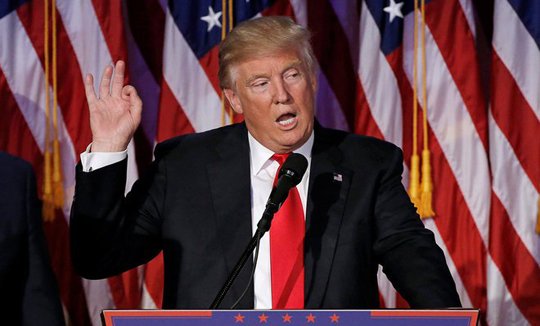Jerusalem, Nov 12: US President-elect Donald Trump pledged Friday to work for a “just, lasting peace” between Israel and the Palestinians, in his first public message on the issue since his upset victory.

“I believe that my administration can play a significant role in helping the parties to achieve a just, lasting peace,” Trump said in a message published by the Israel Hayom newspaper.
He also said that any peace deal “must be negotiated between the parties themselves, and not imposed on them by others.”
France is currently pushing for an international conference to revitalize the moribund peace process, but Israel has said it will not take part — saying any peace talks should be bilateral between the two sides.
Russia has also offered to host direct talks between the two sides that have so far yet to take place.
The Palestinians have called for international involvement, accusing Israel of reneging on past agreements.
Speaking Friday after meeting Russian Prime Minister Dmitry Medvedev, Palestinian President Mahmoud Abbas said Trump’s victory was “American business.”
“We followed the electoral process for over a year. What matters to us is what Mr. Trump will say once he enters the White House,” he said at a press conference.
He added that he had stressed to Medvedev his willingness to hold negotiations in Russia “but the Israeli side asked to postpone it.”
Medvedev said Russia was willing to “immediately” open a dialogue between the two sides, whether under Russian or international mediation.
Israeli Prime Minister Benjamin Netanyahu and US President Barack Obama have had frosty relations for much of the past eight years, but initial indications are that Trump’s victory could see a warming of personal relations.
Netanyahu was among the first leaders Trump spoke to after his election victory, and the president-elect’s message called Israel a “beacon of hope.”
“Israel and America share so many of the same values, such as freedom of speech, freedom of worship and the importance of creating opportunities for all citizens to pursue their dreams,” Trump’s Israel Hayom message said.
Also Friday, French presidential sources said Trump and President Francois Hollande vowed in a telephone call to try “clarify positions” on potentially thorny issues including climate change.
In a first call lasting 7-8 minutes the two leaders discussed the fight against terrorism, the battle against Daesh in Iraq and Syria, the conflict in eastern Ukraine and the Paris climate accord, a French presidential source said.
The two men expressed a “desire to work together,” the source added.
Climate change denier Trump has caused alarm in France by pledging to withdraw from the landmark deal to tackle global warming struck in Paris in December 2015.
The French also took a dim view of Trump’s claim that the terror attacks that left 130 people dead in Paris a year ago this week might have been avoided if the country had looser gun laws.
But in their talks Hollande and Trump sought common ground, emphasising the friendship between their countries and the “history and values” they share, the source said.
Hollande had vowed a “frank” discussion with the Republican.
“Donald Trump has been elected. My duty is to ensure that we have the best relations but on the basis of frankness and clarity,” Hollande told France 2 television earlier.
On Wednesday, he had warned that Trump’s stunning election win “opens a period of uncertainty.”
Hollande had made no secret of his desire to see Hillary Clinton win the White House, declaring a few months ago that Trump’s excesses “make you want to retch.”
His call with Trump came a day after talks between the forthcoming US president and German Chancellor Angela Merkel.
Merkel congratulated Trump and said she looked forward to meeting him, at the latest, when Germany hosts a G20 summit in July in the northern port city of Hamburg.
Merkel had offered Trump “close cooperation” and “stressed that Germany and the US are closely tied through common values,” her spokesman Georg Streiter said.
On Wednesday, Merkel had issued a first statement on Trump’s election, in which she pointedly said cooperation must be based on shared democratic values and respect for human dignity and reminded him of the global responsibility he carries.
The Spanish government, meanwhile, said that Trump’s election “opens a period of uncertainty” although his first steps have been in the right direction.
“With respect to the new president of the US it is true that it opens a period of a period of uncertainty,” government spokesman Inigo Mendez de Vigo told a news conference after a weekly cabinet meeting.
Trump’s conciliatory victory speech as well as his meeting with outgoing US President Barack Obama where they appeared to det aside past animosity “go in the right direction,” the spokesman added.
“We know the president elect in political terms from what he said during the campaign” but “during election campaigns sometimes things are said that are not easy to implement,” Mendez de Vigo said.





Comments
Add new comment